Charles E W Bean, Diaries, AWM38 3DRL 606/261/1 - 1929 - 1930 - Part 2
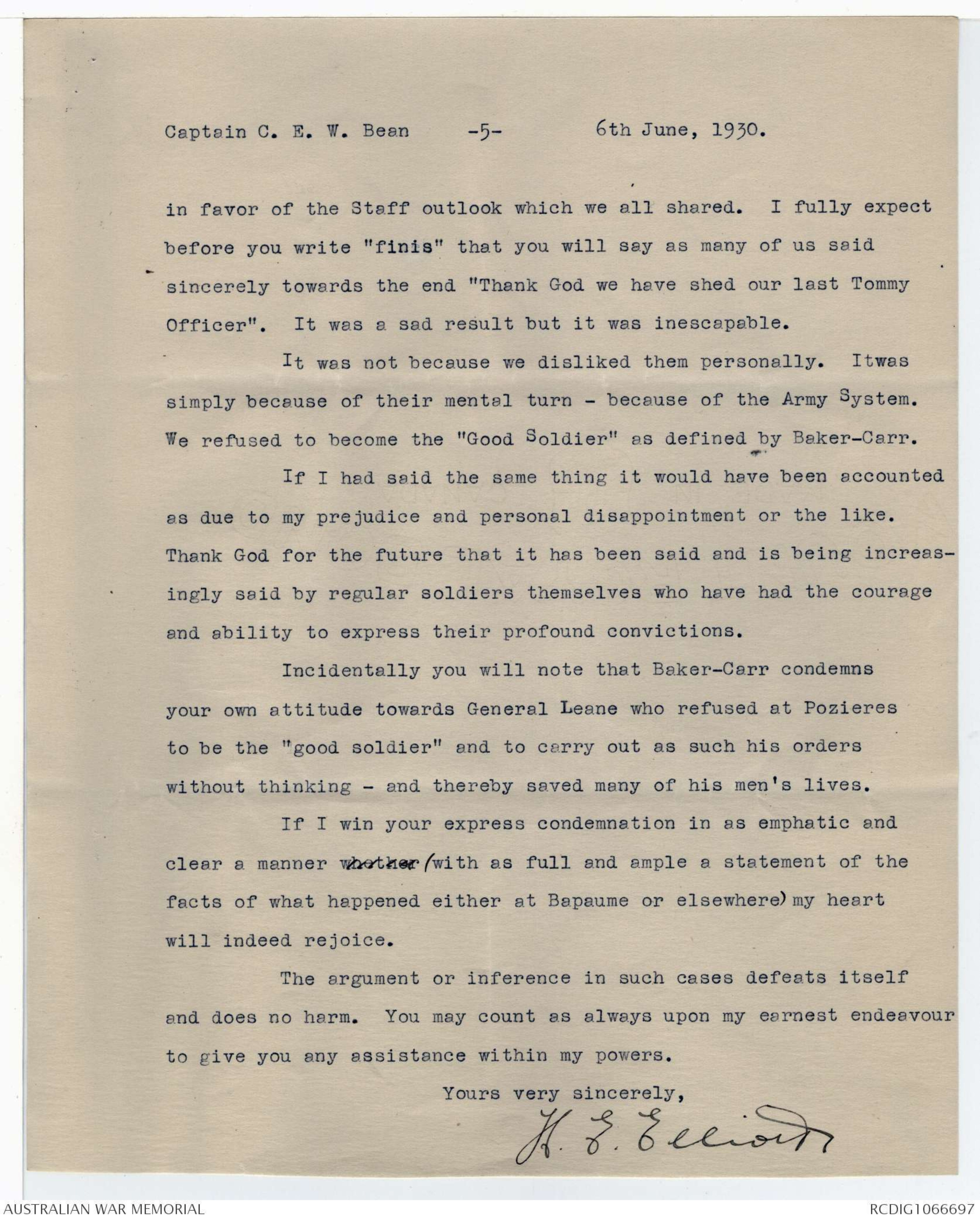
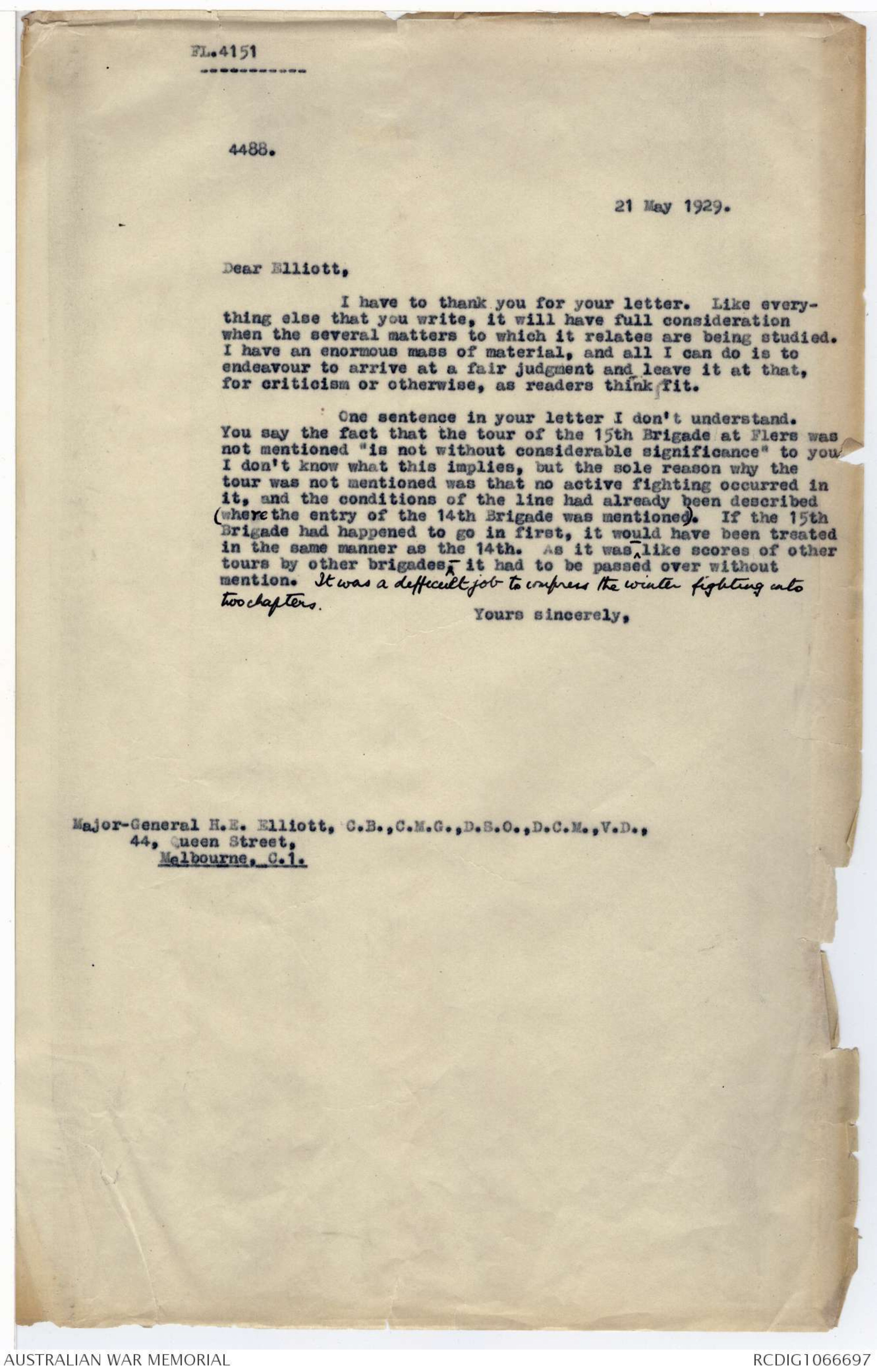
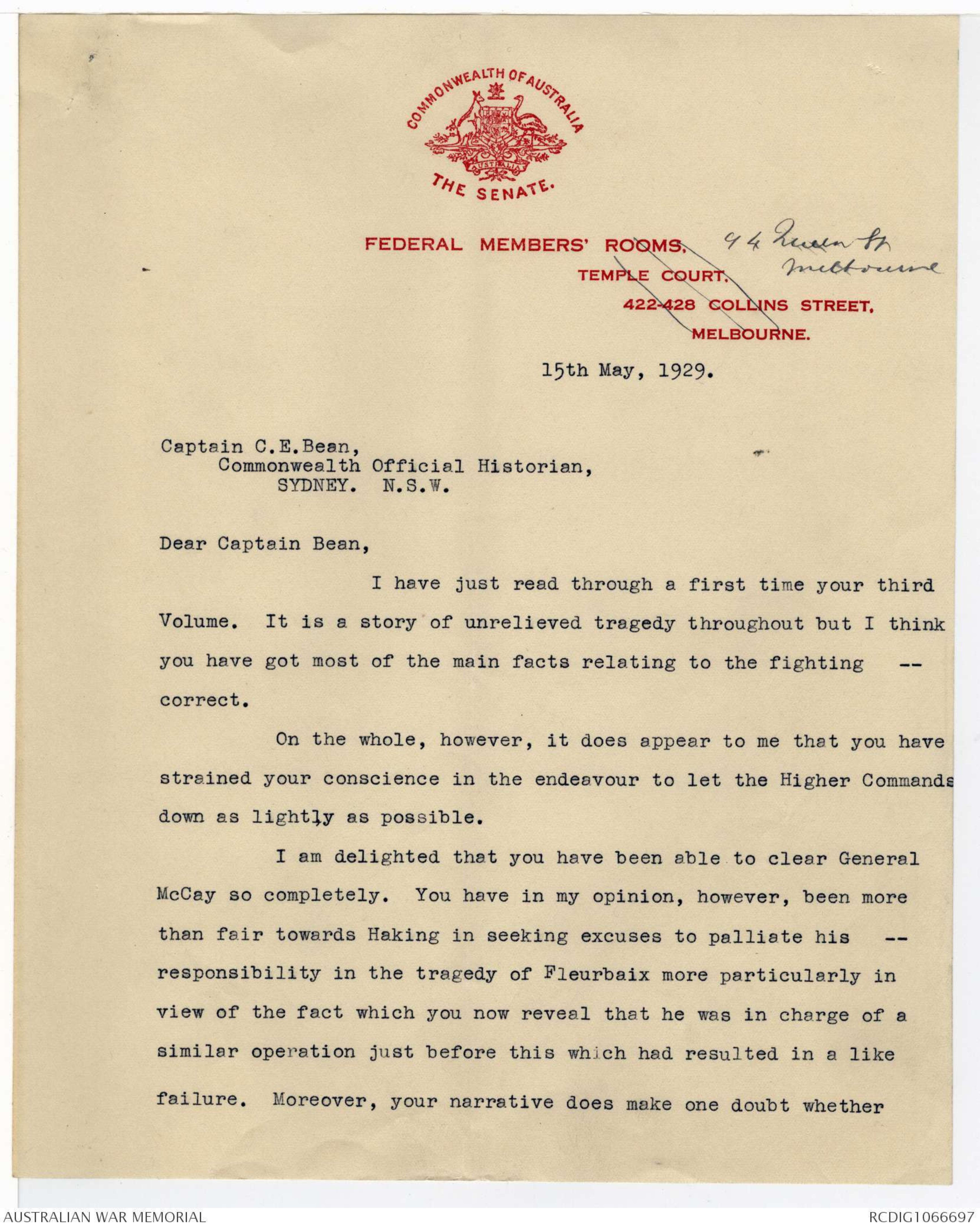
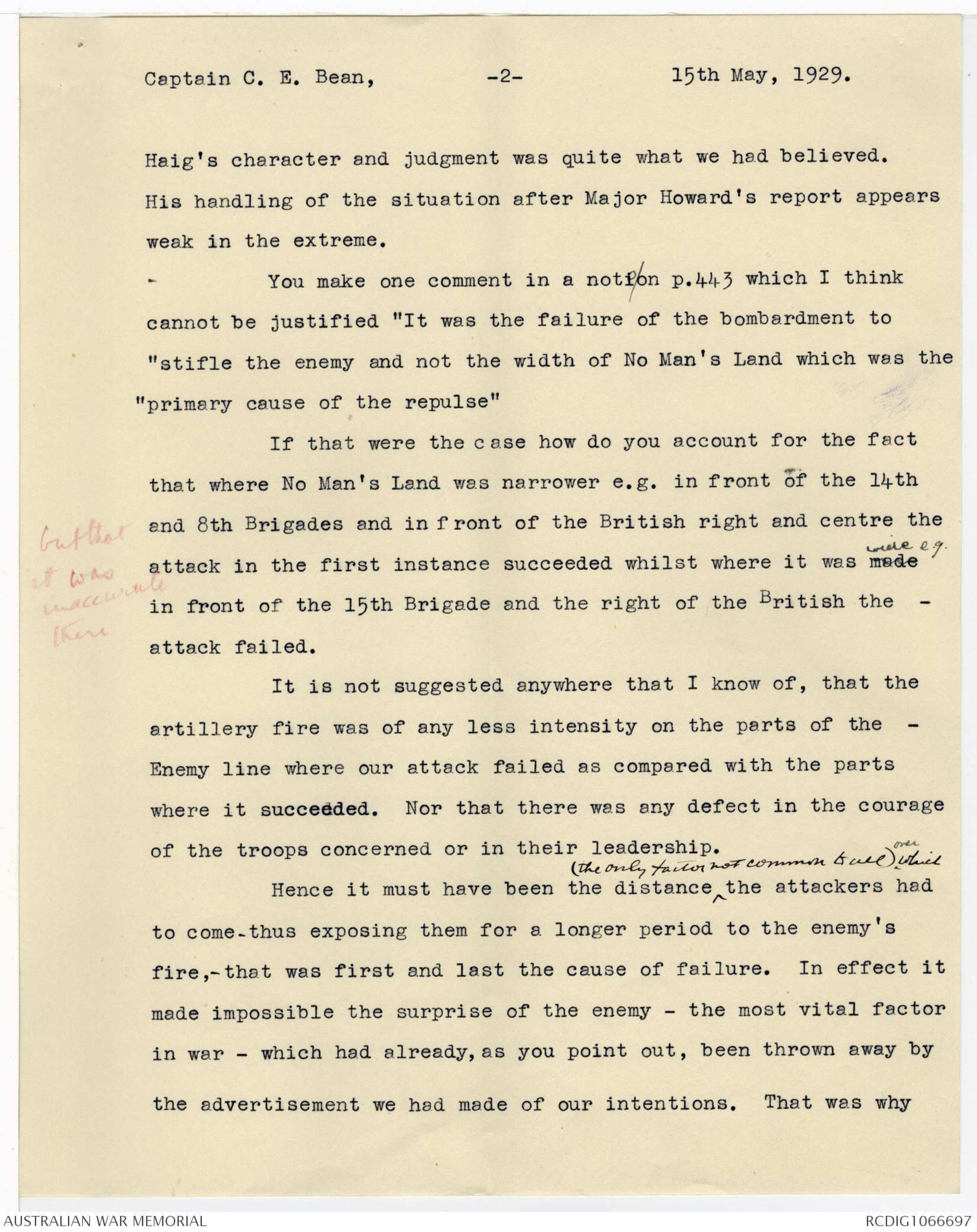
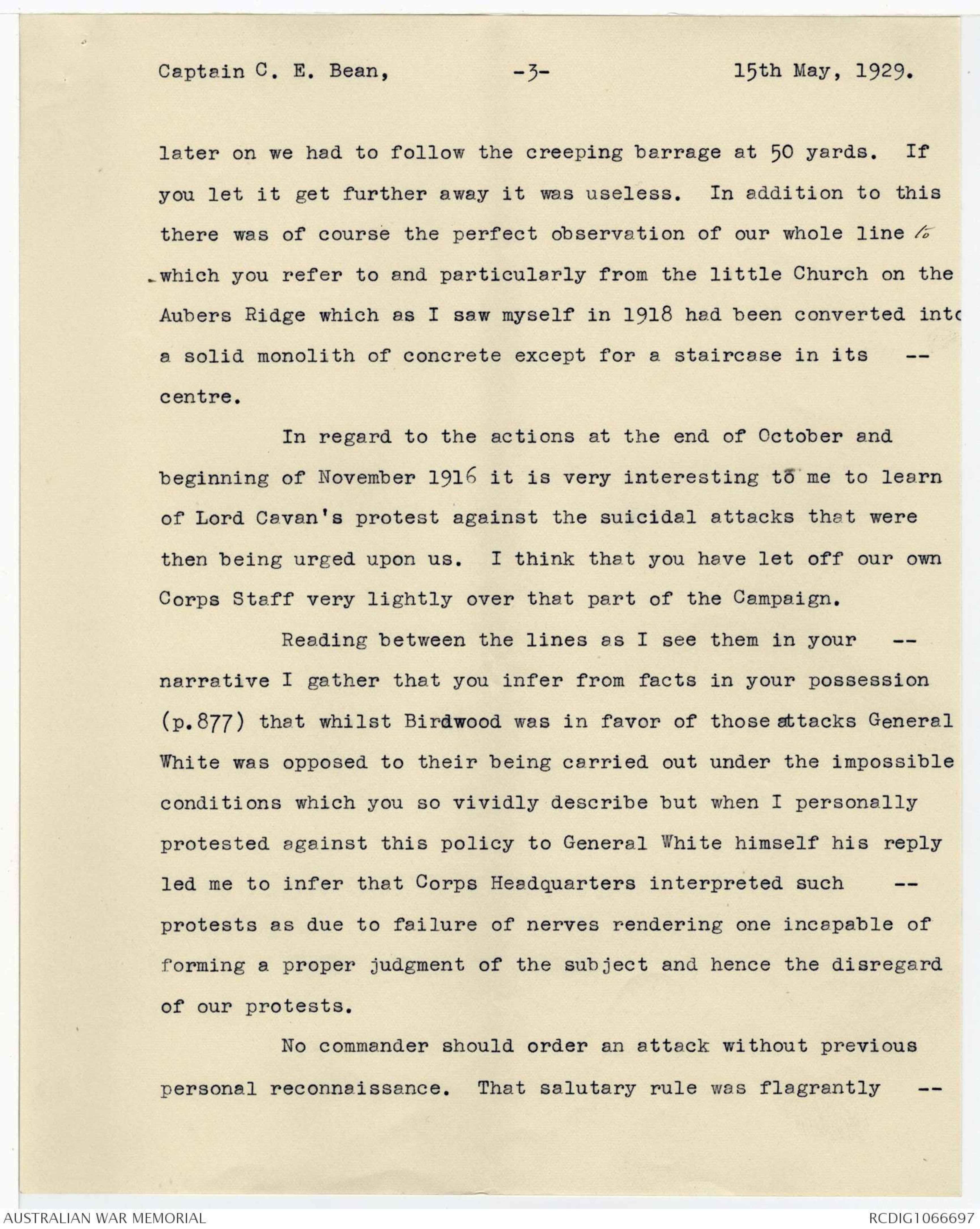
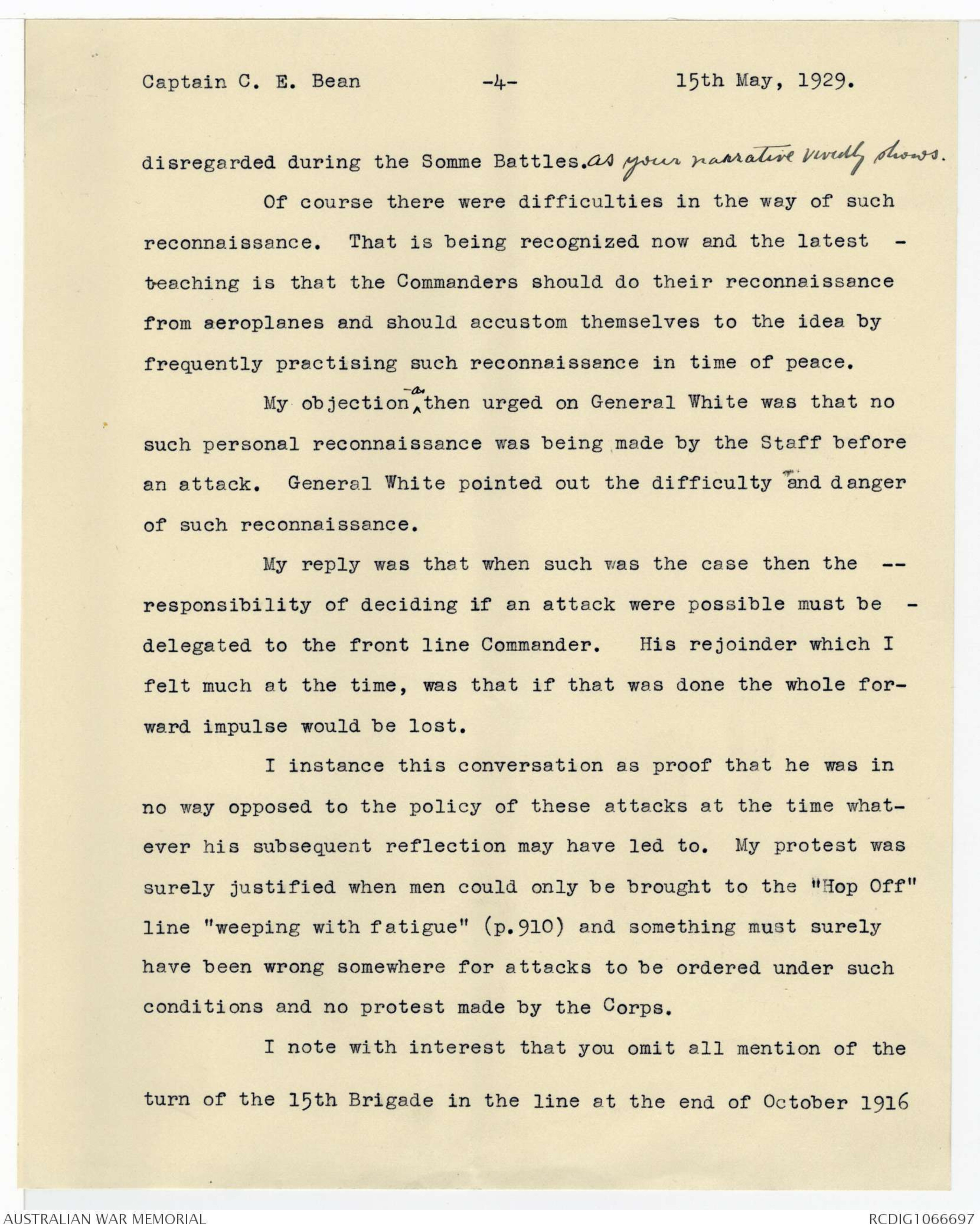
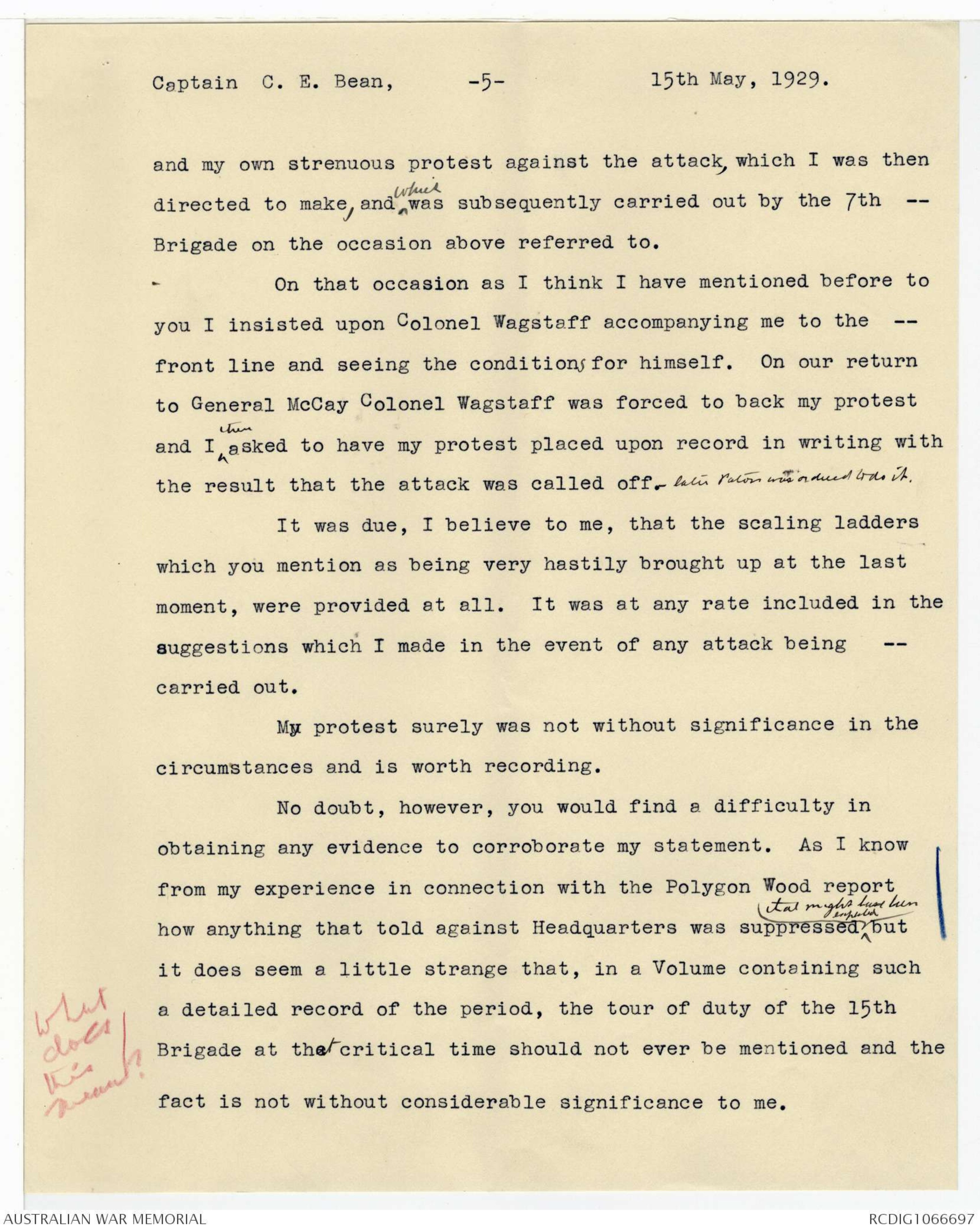
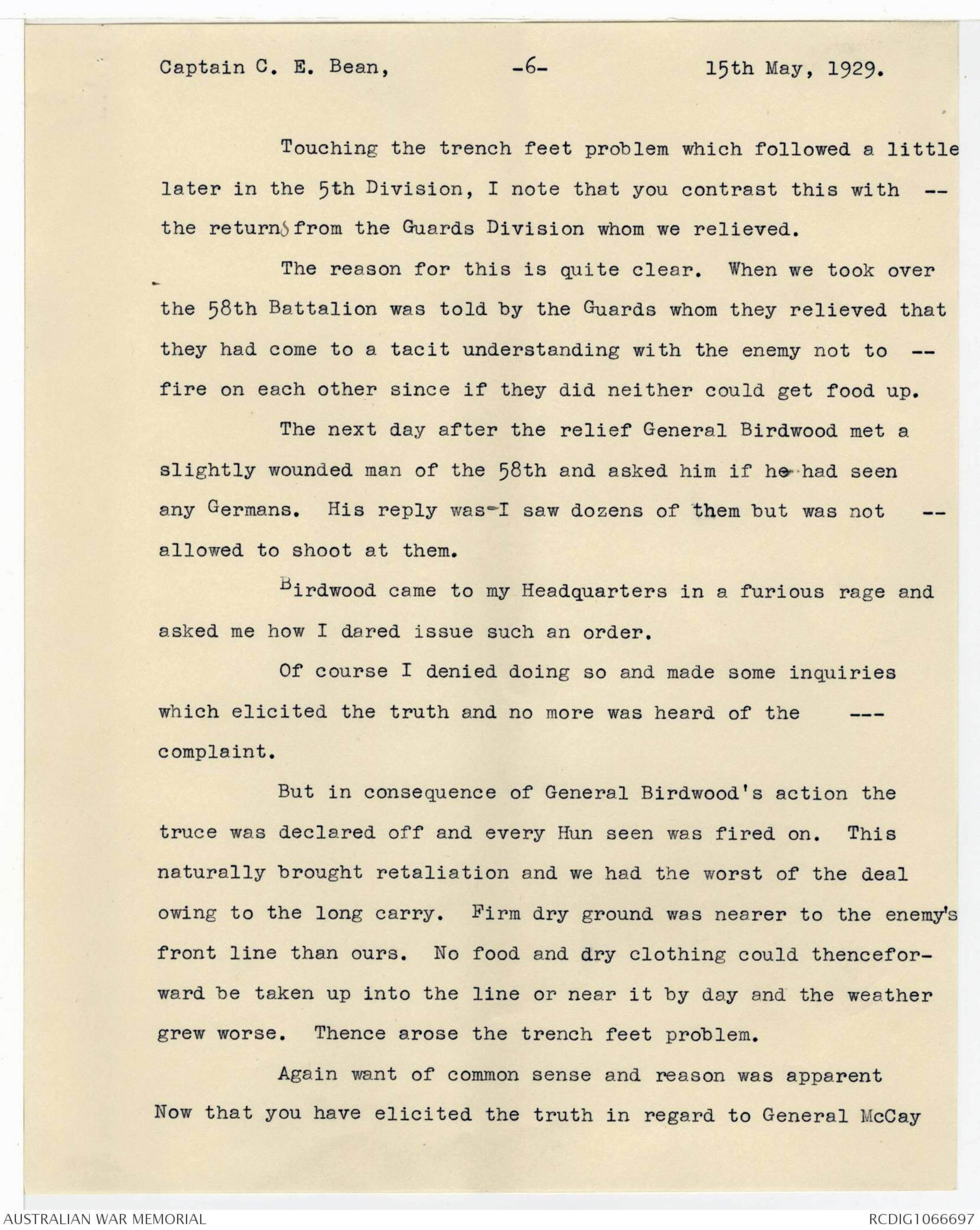
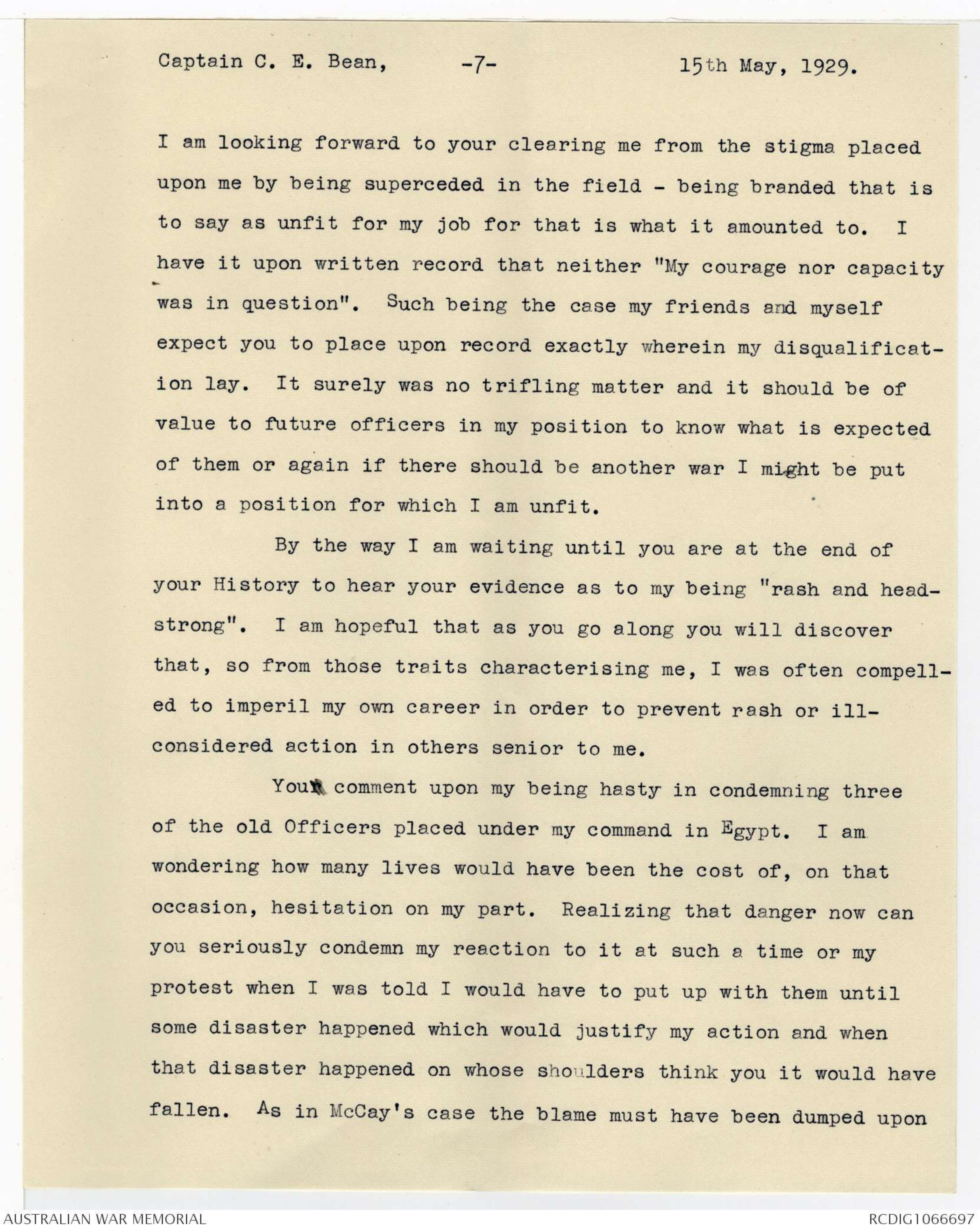
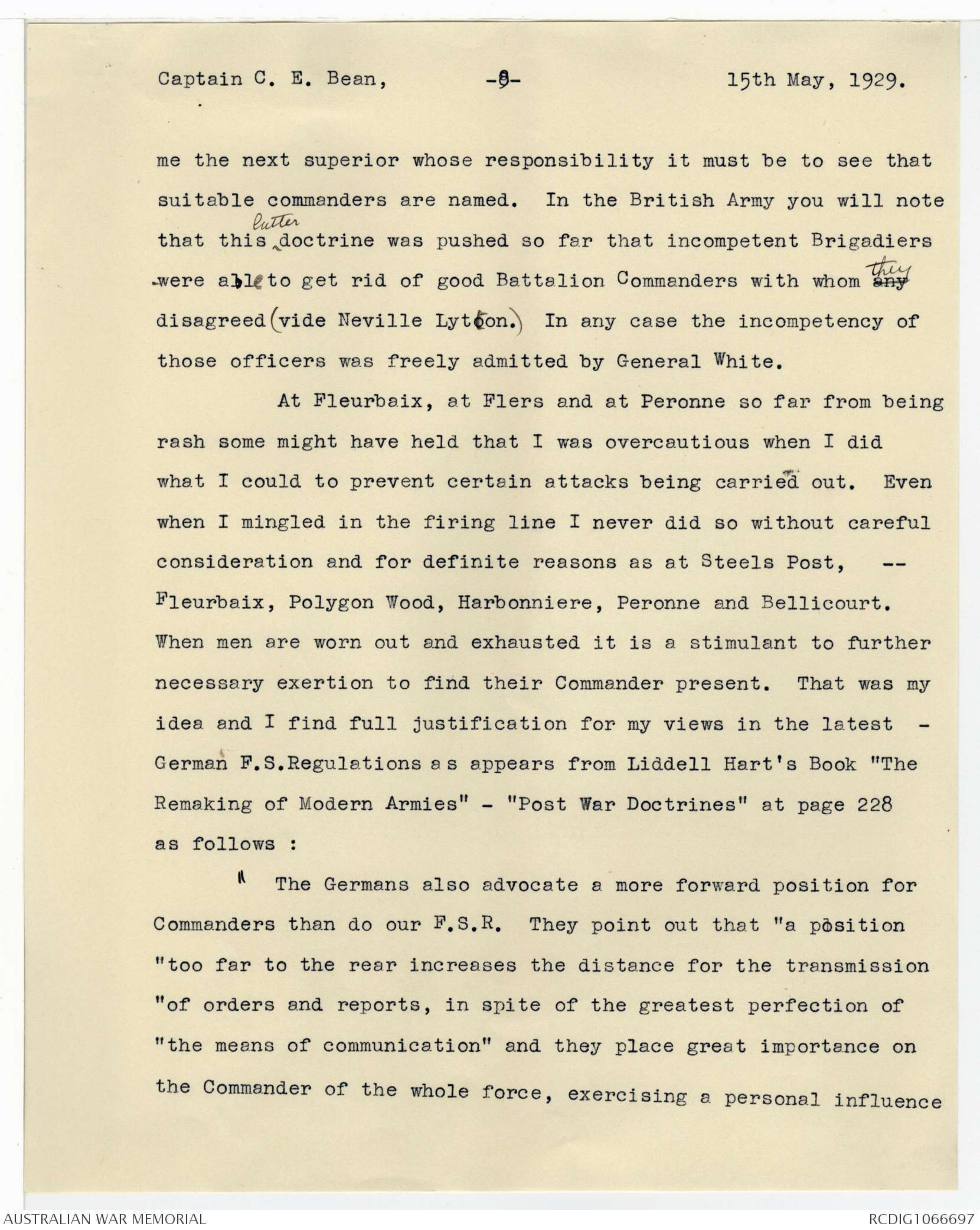
Captain C. E. W. Bean -5- 6th June, 1930.
in favor of the Staff outlook which we all shared. I fully expect
before you write "finis" that you will say as many of us said
sincerely towards the end "Thank God we have shed our last Tommy
Officer". It was a sad result but it was inescapable.
It was not because we dislike them personally. It was
simply because of their mental turn - because of the Army System.
We refused to become the "Good Soldier" as defined by Baker-Carr.
If I had said the same thing it would have been accounted
as due to my prejudice and personal disappointment or the like.
Thank God for the future that it has been said and is being increasingly
said by regular soldiers themselves who have had the courage
and ability to express their profound convictions.
Incidentally you will note that Baker-Carr condemns
your own attitude towards General Leane who refused at Pozieres
to be the "good soldier" and to carry out as such his orders
without thinking - and thereby saved many of his men's lives.
If I win your express condemnation in as emphatic and
clear a manner whether/ with as full and ample a statement of the
facts of what happened either at Bapaume or elsewhere, my heart
will indeed rejoice.
The argument or inference in such cases defeats itself
and does no harm. You may count as always upon my earnest endeavour to give you any assistance within my powers.
Yours very sincerely,
H.E.Elliott
FL.4151
4488.
21 May 1929.
Dear Elliott,
I have to thank you for your letter, Like everything
else that you write, it will have full consideration
when the several matters to which it relates are being studied.
I have an enormous mass of material, and all I can do is to
endeavour to arrive at a fair judgment and leave it at that,
for criticism or otherwise, as readers think fit.
One sentence in your letter I don't understand.
You say the fact that the tour of the 15th Brigade at Flers was
not mentioned "is not without considerable significance" to you
I dont' know what this implies, but the sole reason why the
tour was not mentioned was that no active fighting occurred in
it, and the conditions of the line had already been described
(where the entry of the 14th Brigade was mentioned). If the 15th
Brigade had happened to go in first, it would have been treated
in the same manner as the 14th. As it was ^ like scores of other
tours by other brigades.^It was a difficult job to express the written fighting into two chapters. it had to be passed over without mention.
Yours sincerely,
Major-General H.E.Elliott, C.B., C.M.G., D.S.C., D.C.M., V.D.,
44, Queen Street,
Melbourne. C. 1.
COMMONWEALTH OF AUSTRALIA
THE SENATE.
FEDERAL MEMBERS' ROOMS.
TEMPLE COURT.
422-428 COLLINS STREET,
MELBOURNE.
44 Queen St
Melbourne
15th May, 1929.
Captain C.E.Bean,
Commonwealth Official Historian,
SYDNEY. N.S.W.
Dear Captain Bean,
I have just read through a first time your third
Volume. It is a story of unrelieved tragedy throughout but I think
you have got most of the main facts relating to the fighting --
correct.
On the whole, however, it does appear to me that you have
strained your conscience in the endeavour to let the Higher Commands
down as lightly as possible.
I am delighted that you have been able to clear General
McCay so completely. You have in my opinion, however, been more
than fair towards Haking in seeking excuses to palliate his --
responsibility in the tragedy of Fleurbaix more particularly in
view of the fact which you now reveal that he was in charge of a
similar operation just before this which had resulted in a like
failure. Moreover, your narrative does make one doubt whether
Captain C. E. Bean, -2- 15th May, 1929.
Haig's character and judgment was quite what we had believed.
His handling of the situation after Major Howard's report appears
weak in the extreme.
You make one comment in a note/on p.443 which I think
cannot be justified "It was the failure of the bombardment to
"stifle the enemy and not the width of No Man's Land which was the
"primary cause of the repulse".
If that were the case how do you account for the fact
that where No Man's Land was narrower e.g. in front of the 14th
and 8th Brigades and in front of the British right and centre the
attack in the first instance succeeded whilst where it was made wide e.g. in front of the 15th Brigade and the right of the British the -
attack failed.
[but that it was inaccurate there]
It is not suggested anywhere that I know of, that the
artillery fire was of any less intensity on the parts of the -
Enemy line where our attack failed as compared with the parts
where it succeeded. Nor that there was any defect in the courage
of the troops concerned or in their leadership.
Hence it must have been the distance ^ (the only factor not common to all) over which the attackers had to come thus exposing them for a longer period to the enemy's fire, - that was first and last the cause of failure. In effect it made impossible the surprise of the enemy - the most vital factor in war - which had already, as you point out, been thrown away by the advertisement we had made of our intentions. That was why
Captain C. E. Beam, -3- 15th May, 1929.
later on we had to follow the creeping barrage at 50 yards. If
you let it get further away it was useless. In addition to this
there was of course the perfect observation of our whole line to
-which you refer to and particularly from the little Church on the
Aubers Ridge which as I saw myself in 1918 had been converted into
a solid monolith of concrete except for a staircase in its --
centre.
In regard to the actions at the end of October and
beginning of November 1916 it is very interesting to me to learn
of Lord Cavan's protest against the suicidal attacks that were
then being urged upon us. I think that you have let off our own
Corps Staff very lightly over that part of the Campaign.
Reading between the lines as I see them in your --
narrative I gather that you infer from facts in your possession
(p.877) that whilst Birdwood was in favor of those attacks General
White was opposed to their being carried out under the impossible
conditions which you so vividly describe but when I personally
protested against this policy to General White himself his reply
led me to infer that Corps Headquarters interpreted such --
protests as due to failure of nerves rendering one incapable of
forming a proper judgment of the subject and hence the disregard
of our protests.
No commander should order an attack without previous
personal reconnaissance. That salutary rule was flagrantly --
Captain C. E. Bean -4- 15th May, 1929.
disregarded during the Somme Battles. as your narrative vividly shows.
Of course there were difficulties in the way of such
reconnaissance. That is being recognized now and the latest -
teaching is that the Commanders should do their reconnaissance
from aeroplanes and should accustom themselves to the idea by
frequently practising such reconnaissance in time of peace.
My objection^ as then urged on General White was that no
such personal reconnaissance was being made by the Staff before
an attack. General White pointed out the difficulty and danger
of such reconnaissance.
My reply was that when such was the case then the --
responsibility of deciding if an attack were possible must be -
delegated to the front line Commander. His rejoinder which I
felt much at the time, was that if that was done the whole forward
impulse would be lost.
I instance this conversation as proof that he was in
no way opposed to the policy of these attacks at the time whatever
his subsequent reflection may have led to. My protest was
surely justified when men could only be brought to the "Hop Off"
line "weeping with fatigue" (p.910) and something must surely
have been wrong somewhere for attacks to be ordered under such
conditions and no protest made by the Corps.
I note with interest that you omit all mention of the
turn of the 15th Brigade in the line at the end of October 1916
Captain C. E. Bean, -5- 15th May, 1929.
and my own strenuous protest against the attack, which I was then
directed to make, and ^which was subsequently carried out by the 7th -
Brigade on the occasion above referred to.
On that occasion as I think I have mentioned before to
you I insisted upon Colonel Wagstaff accompanying me to the --
front line and seeing the conditions for himself. On our return
to General McCay Colonel Wagstaff was forced to back my protest
and I ^then asked to have my protest placed upon record in writing with the result that the attack was called off, later Paton was ordered to do it.
It was due, I believe to me, that the scaling ladders
which you mention as being very hastily brought up at the last
moment, were provided at all. It was at any rate included in the
suggestions which I made in the event of any attack being --
carried out.
My protest surely was not without significance in the
circumstances and is worth recording.
No doubt, however, you would find a difficulty in
obtaining any evidence to corroborate my statement. As I know
from my experience in connection with the Polygon Wood report
how anything that told again Headquarters was suppressed ^that might have been expected but it does seem a little strange that, in a Volume containing such a detailed record of the period, the tour of duty of the 15th Brigade at that critical time should not ever be mentioned and the fact is not without considerable significance to me.
[what does this mean?]
Captain C. E. Bean, -6- 15th May, 1929.
Touching the trench feet problem which followed a little
later in the 5th Division, I note that you contrast this with --
the returns from the Guards Division whom we relieved.
The reason for this is quite clear. When we took over
the 58th Battalion was told by the Guards whom they relieved that
they had come to a tacit understanding with the enemy not to --
fire on each other since if they did neither could get food up.
The next day after the relief General Birdwood met a
slightly wounded man of the 58th and asked him if he had seen
any Germans. His reply was I saw dozens of them but was not --
allowed to shoot at them.
Birdwood came to my Headquarters in a furious rage and
asked me how I dared issue such an order.
Of course I denied doing so and made some inquiries
which elicited the truth and no more was heard of the --
complaint.
But in consequence of General Birdwood's action the
truce was declared off and every Hun seen was fired on. This
naturally brought retaliation and we had the worst of the deal
owing to the long carry. Firm dry ground was nearer to the enemy's
front line than ours. No food and dry clothing could thenceforward
be taken up into the line or near it by day and the weather
grew worse. Thence arose the trench feet problem.
Again want of common sense and reason was apparent
Now that you have elicited the truth in regard to General McCay
Captain C. E. Bean, -7- 15th May, 1929.
I am looking forward to your clearing me from the stigma placed
upon me by being superceded in the field - being branded that is
to say as unfit for my job for that is what it amounted to. I
have it upon written record that neither "My courage nor capacity
was in question". Such being the case my friends and myself
expect you to place upon record exactly wherein my disqualification
lay. It surely was no trifling matter and it should be of
value to future officers in my position to know what is expected
of them or again if there should be another war I might be put
into a position for which I am unfit.
By the way I am waiting until you are at the end of
your History to hear your evidence as to my being "rash and headstrong". I am hopeful that as you go along you will discover
that, so from those traits characterising me, I was often compelled
to imperil my own career in order to prevent rash or ill-considered
action in others senior to me.
Your comment upon my being hasty in condemning three
of the old Officers placed under my command in Egypt. I am
wondering how many lives would have been the cost of, on that
occasion, hesitation on my part. Realizing that danger now can
you seriously condemn my reaction to it at such a time or my
protest when I was told I would have to put up with them until
some disaster happened which would justify my action and when
that disaster happened on whose shoulders think you it would have
fallen. As in McCay's case the blame must have been dumped upon
Captain C. E. Bean, -8- 15th May, 1929.
me the next superior whose responsibility it must be to see that
suitable commanders are named. In the British Army you will note
that this ^latter doctrine was pushed so far that incompetent Brigadiers
were able to get rid of good Battalion Commanders with whom any they disagreed (vide Neville Lytton.) In any case the incompetency of
those officers was freely admitted by General White.
At Fleurbaix, at Flers and at Peronne so far from being
rash some might have held that I was overcautious when I did
what I could to prevent certain attacks being carried out. Even
when I mingled in the firing line I never did so without careful
consideration and for definite reasons as at Steels Post, --
Fleurbaix, Polygon Wood, Harbonniere, Peronne and Bellicourt.
When men are worn out and exhausted it is a stimulant to further
necessary exertion to find their Commander present. That was my
idea and I find full justification for my views in the latest -
German F.S.Regulations as appears from Liddell Hart's Book "The
Remaking of Modern Armies"- "Post War Doctrines" at page 228
as follows:
"The Germans also advocate a more forward position for
Commanders than do our F.S.R. They point out that " a position
"too far to the rear increases the distance for the transmission
"of orders and reports, in spite of the greatest perfection of
"the means of communication" and they place great importance on
the Commander of the whole force, exercising a personal influence
 Sam scott
Sam scottThis transcription item is now locked to you for editing. To release the lock either Save your changes or Cancel.
This lock will be automatically released after 60 minutes of inactivity.